This article shares the essential steps to find out if a Registered Behavior Technician (RBT) can work as an independent contractor. We’ll look at important aspects like:
These steps are vital because they help ensure compliance with state regulations and industry standards. Ultimately, this guidance helps you make informed decisions about hiring or working as an RBT independently. Let’s explore this together!
Navigating the complex world of independent contracting in behavior analysis can feel overwhelming, especially for Registered Behavior Technicians (RBTs). With the growing demand for qualified professionals, it's essential to understand whether an RBT can work as an independent contractor. This is important for both practitioners and clients. Let’s explore this together!
In this article, we’ll outline some key steps to help determine if independent contracting is a viable option for RBTs:
We’ll cover it all. But what about the hidden challenges and legal implications that might come into play? It’s crucial to be aware of these factors as you consider your options.
Start by checking the BACB website to confirm the RBT's certification status. This ensures that the RBT is officially recognized and certified to provide support. 😊
Next, verify that the RBT has completed the essential 40 hours of training. This step is crucial as it equips them with foundational knowledge in behavior analysis principles.
It's also important to ensure the RBT has successfully passed the RBT exam. This exam consists of 85 multiple-choice questions, and they need a minimum passing score of 200 out of 250. This assessment evaluates their understanding and application of ABA concepts.
Don't forget to confirm that the RBT's certification is current and hasn't expired. Regular renewal is key to maintaining their qualifications and keeping them updated on best practices.
Lastly, take a moment to review any additional credentials or specialized training that might be relevant to your child's specific needs. This could include certifications in particular therapeutic techniques or experience with certain age groups or conditions, which can enhance the RBT's ability to provide tailored support. Let’s explore this together!
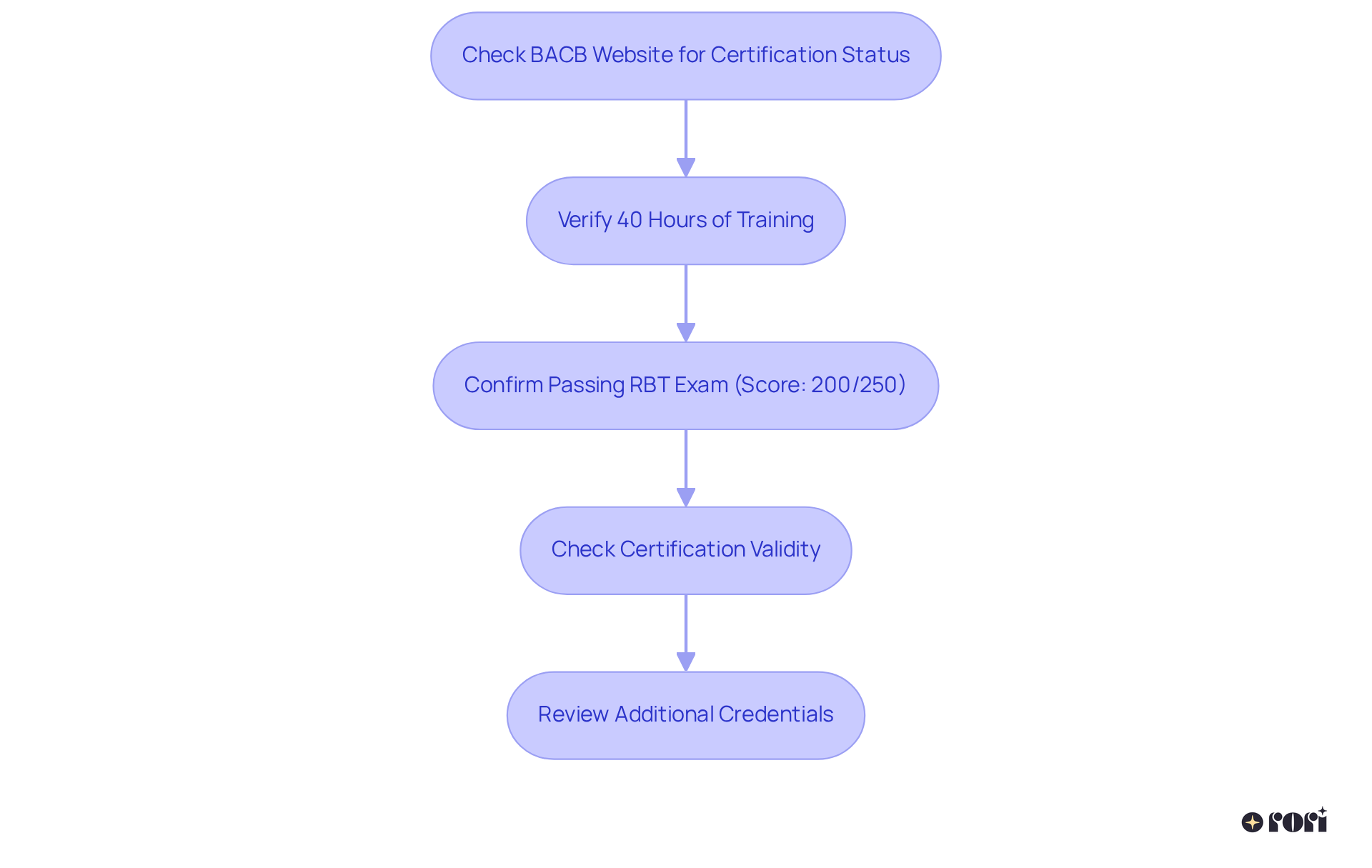
When diving into the world of independent contractors in healthcare, it’s essential to research whether an RBT can be an independent contractor under the specific laws in your state. Regulations can vary quite a bit from one place to another! For example, did you know that 18 states have adopted the 'ABC' rule to determine independent contractor status? Understanding these local laws is crucial.
Now, let’s talk about the IRS classification of independent contractors versus employees. This distinction is especially important in healthcare, where misclassification can lead to significant tax liabilities and compliance headaches. Nobody wants to face lawsuits, audits, or financial burdens, right?
If you’re feeling uncertain about contracts and obligations, don’t hesitate to consult with a legal expert. It’s always a good idea to ensure that your agreements comply with current laws and regulations. As Howard Fienberg pointed out, legislative and regulatory issues are increasingly shaping the landscape for independent contractors.
And here’s a friendly reminder: make sure you comply with HIPAA regulations to protect client confidentiality. Independent contractors must follow the same privacy standards as employees when handling sensitive patient information. At Rori Care, we prioritize this by using HIPAA-compliant technology that anonymizes data before processing. Plus, we allow clients to request data deletion once services are complete. We also leverage advanced LLM models like LLAMA 3, GPT4v, Gemini 1.5, Claude Opus 3, and Mixtral 8x7b to enhance our data handling while staying compliant with HIPAA standards.
It’s also a good idea to familiarize yourself with any licensing requirements specific to your state. These can affect the ability of independent contractors, such as those who ask, 'can an RBT be an independent contractor', to operate legally within the healthcare system. Understanding these requirements is key to maintaining compliance and avoiding potential legal pitfalls. Let’s explore this together and ensure you’re on the right track!
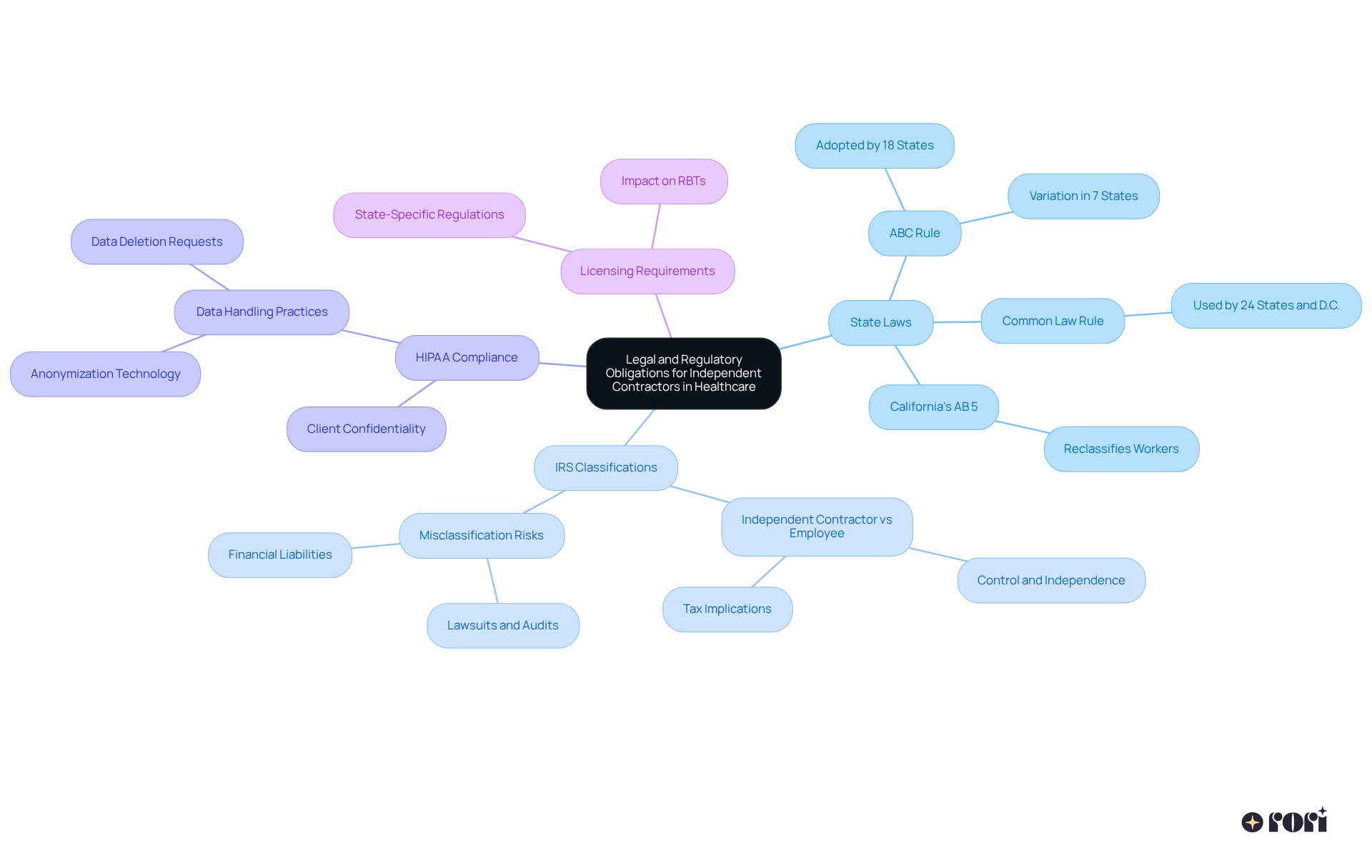
Choosing the right organizational framework is super important for anyone wondering if an RBT can be an independent contractor in ABA therapy. Let’s walk through some essential steps to get your business up and running:
First, think about what business structure fits you best—like a sole proprietorship, LLC, or corporation. Many in the healthcare field lean towards an LLC because it offers great liability protection and tax flexibility.
Next, don’t forget to register your business with the right state authorities. This step is crucial for making sure you comply with local regulations, which helps legitimize your practice and keep your interests safe.
Make sure to acquire any licenses or permits that your state requires for the services you plan to offer. This might include specific healthcare-related licenses that are key to operating legally.
It’s also a good idea to set up a dedicated commercial bank account. Keeping your personal and professional finances separate not only simplifies your accounting but also boosts your professional image.
Lastly, consider chatting with a financial advisor to get a handle on the tax implications of your chosen business structure. Their guidance can really help you navigate potential deductions and stay compliant with tax regulations.
Let’s explore this together and make sure you’re on the right path!
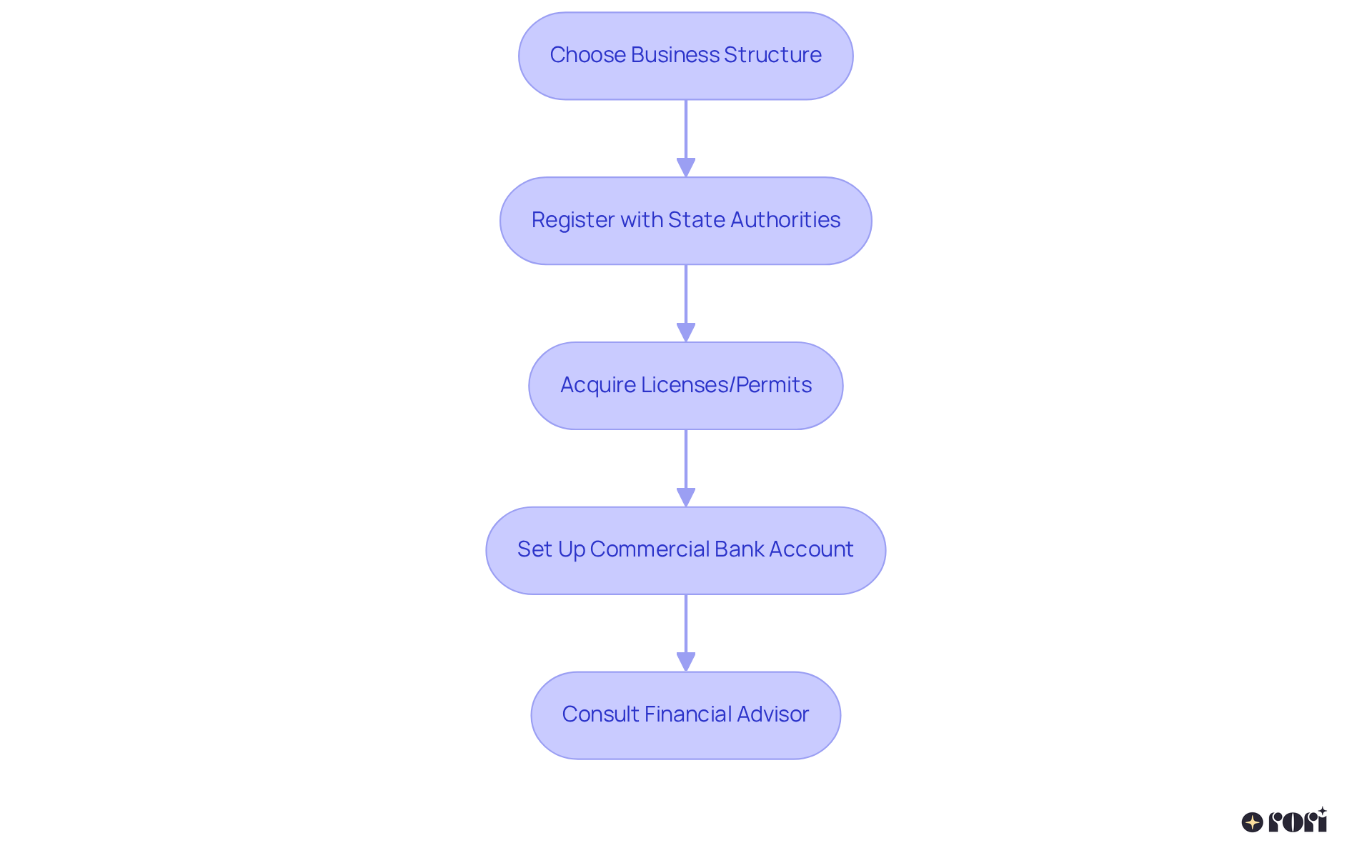
Creating a detailed client agreement is essential for setting clear expectations. It should outline the offerings, payment conditions, and cancellation terms. Plus, incorporating confidentiality clauses is vital to protect client information, especially in sensitive areas like ABA therapy. We’re committed to anonymizing data before processing it and allowing clients to request data removal after completing their projects. This approach helps build trust.
In ABA therapy, contracts typically last between six months to a year. It’s important to define renewal conditions to ensure continuity of care. Before starting any activities, both parties should sign the agreement, creating a formal commitment that protects everyone involved. Regularly reviewing contracts is key to keeping them relevant and compliant with changing legal standards and best practices in healthcare.
Effective management is crucial to prevent contract leakage, so oversight is necessary. Did you know that automating contract management can speed up negotiation cycles by 50%? This aligns perfectly with our goal of enhancing efficiency in ABA therapy. Just like our AI-driven progress report automation, which allows us to dedicate more time to child treatment, our technology uses advanced models like LLAMA 3 and GPT4v to streamline these processes. Let’s explore this together and see how we can make things easier for everyone!
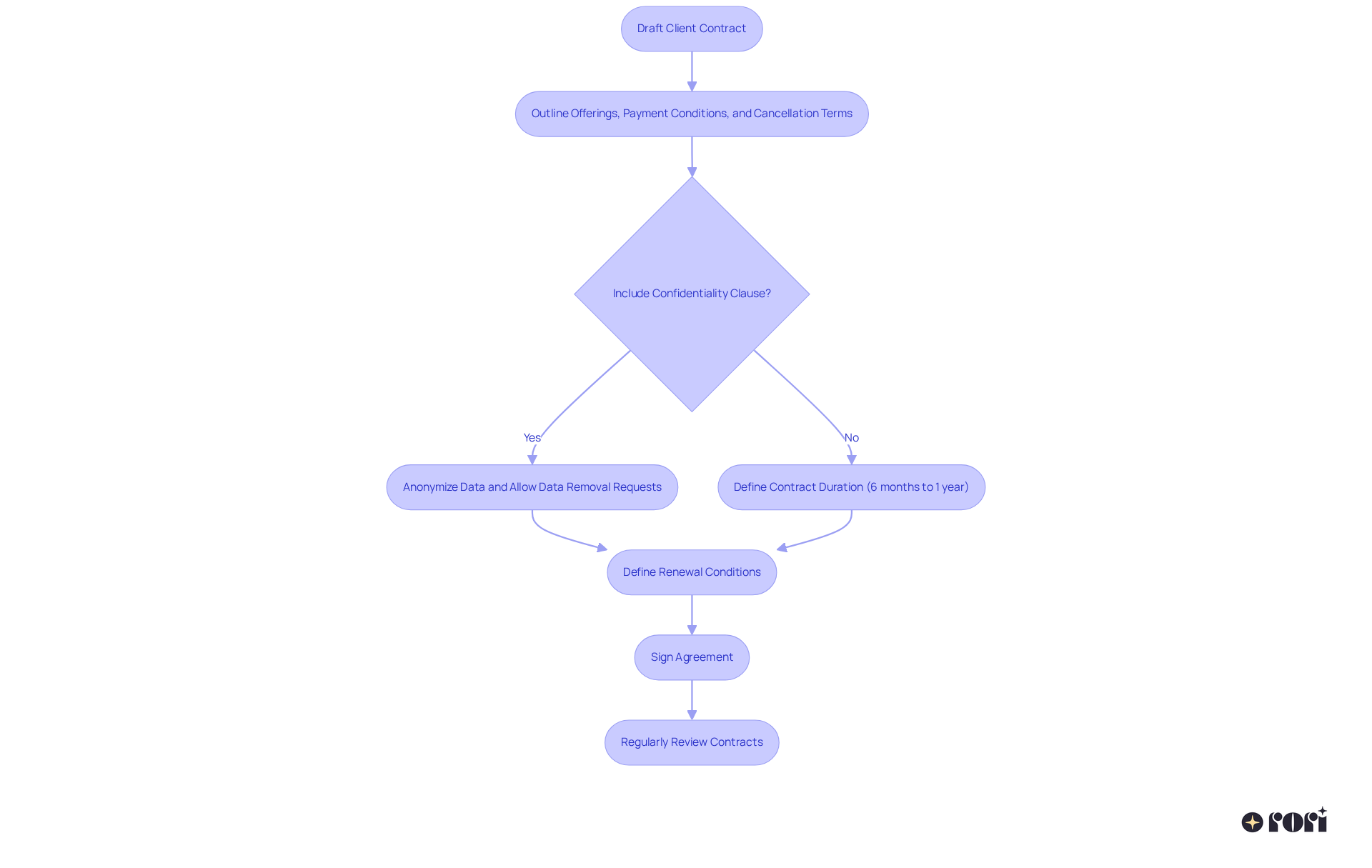
Creating a supervision plan that aligns with the Behavior Analyst Certification Board (BACB) requirements for RBTs is crucial. Remember, at least 5% of their total service hours should be supervised each month. It’s also important that at least half of these supervision hours are one-on-one sessions between the supervisor and the RBT.
At Rori Care, we believe in providing comprehensive autism care. We integrate personalized ABA therapy with advanced AI to make the most of your child’s treatment time. So, be sure to schedule regular supervision sessions to review cases, give performance feedback, and help with skill development. Aim for at least two face-to-face interactions each month, with one of those involving direct observation.
Continuing education is key! Encourage participation in workshops, conferences, coursework, and self-study. These are essential for RBTs to stay updated on best practices and meet the BACB's recertification requirements every two years. Joining professional organizations can also be a great way for RBTs to network and access valuable resources like mentorship and training materials.
Let’s help RBTs set personal development goals aimed at enhancing their skills and knowledge in ABA therapy. This fosters a commitment to continuous learning and professional growth. As Daniel Carter wisely said, 'Supervision should be seen as a requirement and an opportunity for continuous learning and development in behavior analysis.'
It’s vital to emphasize the importance of adhering to supervision requirements. Missing these can jeopardize an RBT's certification status and the quality of care clients receive. Plus, we want to ensure that RBTs are ready to pass the board exam, which tests their mastery of the RBT Task List and their readiness to serve as qualified Registered Behavior Technicians®.
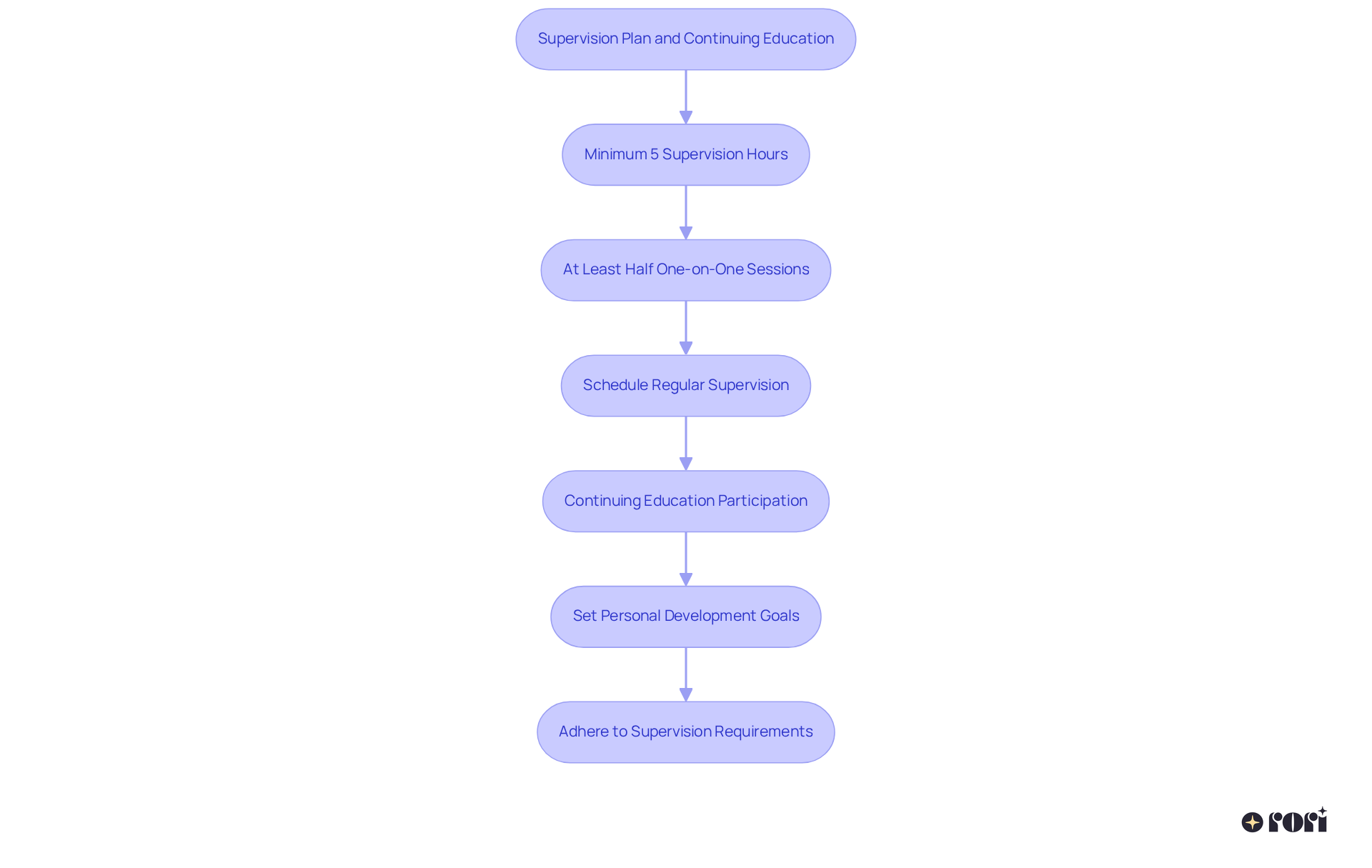
Determining if a Registered Behavior Technician (RBT) can work as an independent contractor is all about understanding certification requirements, legal obligations, and business practices. By following the steps outlined, you can ensure that the RBT is not only qualified but also compliant with the necessary regulations to provide effective support in behavior analysis.
This article highlights some key points to consider, such as:
Each of these components is vital for ensuring that RBTs can deliver quality care while adhering to the standards set by the Behavior Analyst Certification Board (BACB) and other regulatory bodies.
Ultimately, the journey to establishing an RBT as an independent contractor goes beyond just ticking boxes; it’s about creating a professional environment that encourages continuous improvement. By taking these steps seriously, stakeholders can enhance the quality of care provided to clients and ensure that RBTs are well-prepared to meet the challenges of their roles. Engaging in this process not only safeguards compliance but also promotes a culture of excellence in behavior analysis. Let’s explore this together and foster a supportive community for everyone involved!
How can I verify an RBT's certification status?
You can verify an RBT's certification status by checking the BACB website to confirm that the RBT is officially recognized and certified to provide support.
What training is required for an RBT?
An RBT must complete 40 hours of essential training, which provides foundational knowledge in behavior analysis principles.
What is the RBT exam like?
The RBT exam consists of 85 multiple-choice questions, and candidates need a minimum passing score of 200 out of 250 to demonstrate their understanding and application of ABA concepts.
How can I ensure that an RBT's certification is current?
You should confirm that the RBT's certification is current and has not expired, as regular renewal is essential for maintaining their qualifications.
Should I look for additional credentials in an RBT?
Yes, it is important to review any additional credentials or specialized training that may be relevant to your child's specific needs, such as certifications in particular therapeutic techniques or experience with certain age groups or conditions.
Can an RBT work as an independent contractor?
It is essential to research whether an RBT can be classified as an independent contractor under the specific laws in your state, as regulations can vary.
What is the IRS classification for independent contractors versus employees?
The IRS classification distinguishes between independent contractors and employees, which is important in healthcare to avoid misclassification that can lead to tax liabilities and compliance issues.
What should I do if I have questions about contracts and obligations for RBTs?
If you feel uncertain about contracts and obligations, it is advisable to consult with a legal expert to ensure that your agreements comply with current laws and regulations.
How do independent contractors comply with HIPAA regulations?
Independent contractors must follow the same privacy standards as employees when handling sensitive patient information. Compliance can be ensured by using HIPAA-compliant technology and allowing clients to request data deletion after services are complete.
Are there any licensing requirements for RBTs in my state?
Yes, it is important to familiarize yourself with any licensing requirements specific to your state, as these can affect the ability of independent contractors, including RBTs, to operate legally within the healthcare system.